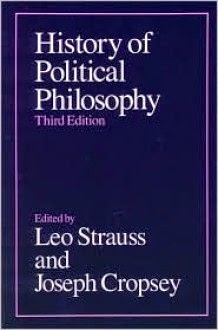Stanley Rosen (1929 - 2014) mocht het hoofdstuk Spinoza doen…
Stanley Rosen zag Spinoza als ‘conservatief’, schreef: "Spinoza is neither a Christian, a modern liberal, nor an existentialist: freedom is for him possible only on the condition of philosophy, and so, in the fullest sense, only the philosopher is free. The free society is absolutely dependent, not on freedom of speech in the sense of anyone's speech, but on freedom of philosophical speech. This is the heart of Spinoza's 'conservatism,' and it is explicitly visible in the Theologico-Political Treatise." [Citaat uit hierna te noemen boek]
 Stanley Rosen was student van Leo Strauss aan de University
of Chicago. Bij hem verdedigde hij in 1955 een proefschrift over Spinoza,
getiteld Spinoza's argument for Political Freedom. [Die titel
wordt op 'zijn' wikipediapagina niet genoemd,
maar was te vinden bij de Duitse Spinozabibliografie; en hier]
Stanley Rosen was student van Leo Strauss aan de University
of Chicago. Bij hem verdedigde hij in 1955 een proefschrift over Spinoza,
getiteld Spinoza's argument for Political Freedom. [Die titel
wordt op 'zijn' wikipediapagina niet genoemd,
maar was te vinden bij de Duitse Spinozabibliografie; en hier]
Dat hij goed naar z’n hoogleraar geluisterd had en in Spinoza geen politiek liberaal zag blijkt al uit het bovenstaande citaat en uit het abstract van de lezing die hij gaf voor het “Symposium: Spinoza’s Law in 2003 waar Rosen sprak over “Spinoza's Argument for Political Freedom,” waarbij de notitie werdgemaakt: “A substantially similar version of this piece has previously been published by Stanley Rosen in Spinoza's Argument for Political Freedom - z'n dissertatie uit 1955 dus. [Cf.]
Abstract: "It is a striking fact in the history of philosophy that one of the most
notorious advocates of metaphysical determinism should have been the first
great philosopher to present a systematic defense of political freedom. This
defense occurs in Spinoza's Tractatus Theologico-Politicus (1670). The
Tractatus appears at first reading to be what Stewart Hampshire calls "the
great liberal conception of toleration and freedom of thought" and "a
classical liberal argument." A closer
examination of the text reveals a different picture.
It cannot be said that Spinoza's metaphysics is congenial to freedom in any
liberal sense of the term. In Spinoza's universe, freedom is the ability to
assert necessity, for no end or purpose beyond itself. The definition of a free
man is given in the section of the Ethics entitled "Of Human
Bondage." Man is free to the extent that he has adequate ideas, which reveal the immutable sequences of determining
causes. It follows that "the soul acts according to fixed laws and is a
sort of spiritual automaton." We imagine that we are free because we do
not understand the causes of our actions. The notion of adequate ideas has
important political consequences, since it underlies Spinoza's fundamental
distinction between the philosophical and the vulgar. Man is necessarily a prey
to his passions, which are passive emotions arising from confused and
inadequate ideas. An adequate idea of an
emotion is no longer a passion." [Cf.]
Hij werd filosofiehoogleraar aan de Pennsylvania State University en schreef meerdere werken over Plato, Heidegger, Hegel en Nietzsche. Na bijna 40 jaar aan Penn State werd hij de Borden Parker Bowne Professor of Philosophy aan de Boston University, een positie die hij nog eens 14 jaar bekleedde tot hij in 2008 emeriteerde.
 In 1963 stelden Leo Strauss & Joseph Cropsey een boek
samen over de geschiedenis van de politieke filosofie: Leo Strauss & Joseph
Cropsey (eds.), History of Political
Philosophy. University of Chicago Press. Rand McNally, 1963 [2nd ed.
1972, 3d ed. 1987]
In 1963 stelden Leo Strauss & Joseph Cropsey een boek
samen over de geschiedenis van de politieke filosofie: Leo Strauss & Joseph
Cropsey (eds.), History of Political
Philosophy. University of Chicago Press. Rand McNally, 1963 [2nd ed.
1972, 3d ed. 1987]
Het bestond vooral uit hoofdstukken over vele politiek-filosofische denkers. Dat ook Spinoza daaronder viel was voor die tijd wel uitzonderlijk. Strauss deed zelf: Plato, Marsilius van Padua en Niccolo Machiavelli. Voor Spinoza zocht hij Stanley Rosen aan. Diens hoofdstuk dat oorspronkelijk de titel droeg “The Political Philosophy of Spinoza” werd in latere drukken “Baruch Spinoza”. Het is in z’n geheel bij books.google te lezen, p. 456 – 475. Het citaat waarmee het blog opent is te vinden op p. 468.
_________________
In Memoriam Stanley Rosen [cf.]
Overzicht van zijn publicaties [cf.]
Samenvatting Spinoza-hoofdstuk voor Kritika & Kontekst, 2009 [cf.]
Zijn portretfoto van hier

